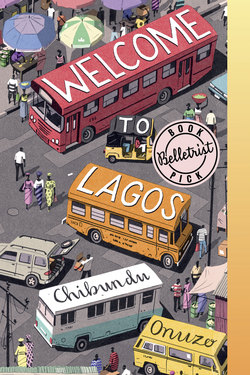Читать книгу Welcome to Lagos - Chibundu Onuzo - Страница 20
На сайте Литреса книга снята с продажи.
Оглавление13
TWO WEEKS LATER, AFTER a meeting at Aso Rock, Chief Sandayọ ran into Senator Danladi, an old friend from university with whom he had never lost touch. Danladi was a career politician who had swung through every level of politics, a democrat, technocrat, and diplomat as the occasion arose.
“Have you put on weight?” Danladi asked, prodding him in the stomach.
“Have you married a new wife?” Sandayọ parried.
“Four is the limit, unfortunately. You really should remarry. Bachelors get up to all sorts in this Abuja. I have some news for you. Walk with me, please.”
Aso Rock was a sprawling complex of offices, halls, and private residences for the president, vice president, and their families, heavyset concrete structures with pillars and domed roofing. There were a mosque and a church on site, an imam and pastor always on standby. The buildings were joined by neat gravel, landscaped with shrubs and cut grass, watered every day, even in the dry season.
“I am afraid you might be fired soon,” Danladi said when they had wandered behind a Ministry of Transport office.
“Where did you hear that?”
“I have my sources.”
Danladi was a well-known confidant of the president. “Perhaps not fired exactly,” Danladi added, casting around with his eyes. “Cabinet reshuffle. You might get another ministry. You might get something else. Maybe a parastatal.”
“It can’t be. Odukọya would have told me.”
“Which Odukọya? The drug baron? What does he know about anything?”
“He’s the one that recommended me for my job.”
“Who told you that? I was the one that mentioned you.”
“But the president said it was an admirer from my YPC days.”
“I, Shehu Danladi, admired the work you did in the southwest. News of it reached us in Kano, backward and illiterate as we are. Kai. You think it’s only a Yoruba man that can do you a favor.”
“Then do me a favor again.”
“The president has made up his mind. He can be stubborn when he thinks you want to use your influence to push him.”
“Please arrange for me to speak to him, then.”
“No. You can’t know of it. I’ve told you so you can prepare.”
“I’m not leaving.”
“You won’t have a choice, Sandy. My advice: start gathering your papers.”
HE CANCELED ALL HIS meetings that day and returned to his mansion, large with small block windows that gave the building a squint. It was an ugly house built on land worth its weight in government contracts. He had little there: a few suitcases, some paintings from his Lagos home, his favorite armchair. It was not his house, only a loan from the government until his ministerial term was up. And yet it could so easily have belonged to him. These things could be arranged, as could all the other suspect perks of being a minister in Abuja.
He climbed upstairs to his room. The house was empty, his maid and cook gone God knows where. He did not often return this early. He lay flat on the four-poster bed, staring at the brocade canopy embroidered with birds in flight. His wife would have hated this master bedroom. It was lit by yellow bulbs that glowed garish from the chandelier. Funkẹ had loved natural light so much, she had designed large glass windows for every room of their house in Lagos, glass windows that had to be covered with metal sheets at night, except for the window of their bedroom, a single bulletproof pane that let her watch the sun rise.
He certainly would not wait to be fired. He would return to his well-lit Lagos home with his suitcases and his armchair and his paintings especially. On the wall hung his favorite Grillo, an indigo long-necked woman, her gele opening like petals around her inscrutable face. It reminded him of Funkẹ when they first met: the elegant, almost scrawny neck, the flamboyant clothes, the pervading mystery in everything she said and did.
If his wife were alive, he would never have taken this job. She hated Abuja with its sterile parks and lit-up avenues, wide freeways that led nowhere. And behind this ordered, meticulous cleanliness, the most unjust, most grotesque, most perverse of transactions. No, Funkẹ’s puritan sensibilities would not have withstood the capital and he would not have come without her.
Theirs, in the beginning, had been a fairy tale. The village boy from Ikire; the Lagos girl with no concept of lack. She had not been the most beautiful but she had embodied his aspirations with her foreign education and the English surname he almost regretted her exchanging for his own. And then she had some sort of experience in a church, a vision, a blinding light, an angelic visitation that had changed her. Stopped drinking. Stopped swearing. Begun building celestial houses, four-story mansions in the sky. It was partly why he had been driven to the YPC, where the goals were more solid.
Their marriage had broken down long before he buried her but they had never lived apart. No matter how far he strayed, Funkẹ remained under his roof, a pious, holy, chanting talisman. He would return to the house she had designed at the height of their love for each other, a mansion charming in its unevenness. Let them keep their Abuja. He was going home to Lagos.
